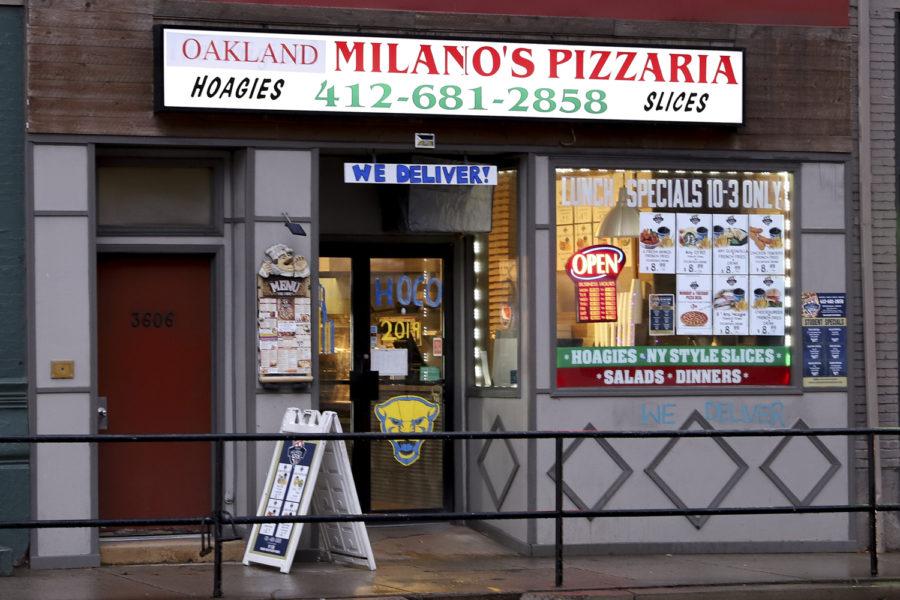Elevate Meal Plan offers new meal plan with local restaurants
Kaycee Orwig | Senior Staff Photographer
Milano’s Pizza is one of 12 local restaurants partnered with Elevate Meal Plans.
December 3, 2019
A pizza from Pie Express or a gyro from Halal Pitt could be on your meal plan next semester – if you’re willing to outsource.
Elevate Meal Plan, a privately owned company started by University of Virginia graduates Seth Kramer and Josh Cohen, has partnered with 12 local restaurants to provide a twist on the concept of a meal plan — students will be able to purchase a meal plan through the company where they get between 45 and 105 meals per semester at a fixed rate.
The greater flexibility and variety of meals is what made Lauren Matulevich, a sophomore pre-physical therapy major, interested in getting an Elevate meal plan when she moves into an apartment for her junior year.
“I want to live in Bouquet, so I don’t know if I even want a Pitt meal plan, so Elevate is something I would look into,” Matulevich said. “I probably would have gone for it as a freshman, but I would definitely go for it now just because I know what I like.”
Elevate is currently on nine other college campuses after being established at UVA in 2016. Kramer and Cohen came up with the idea for Elevate after founding a catering company, FlashCater, for fraternities and sororities at UVA. Elevate Meal Plan is separate from Pitt Dining’s meal plan and can only be purchased on the company’s website. Kramer said Pitt is a perfect addition to their company because of the close proximity to so many restaurants.
“We think students are excited because Pittsburgh is a great market for Elevate,” Kramer said. “There’s so many great restaurants within walking distance of campus, so we think our service is resonating with Pitt students who are looking for an alternative to traditional dining halls.”
Elevate has currently partnered with 12 local restaurants — JJ Poke Bowl, Night Gourmet Market, Lotsa Pizza, Treats and Beans, Halal Pitt, Little Asia, Pie Express, Milano’s Pizza, Prince of India, Ali Baba, Forbes Gyro and Sorrento’s Pizza Roma. Kramer also said Elevate is looking to partner with more restaurants before the start of next semester.
The Elevate meal plan is similar to the Pitt-affiliated plan in that students pay a set price for a certain amount of meals. While Pitt’s prices have not been finalized, Kramer estimated the price will be around $9.50 per meal. Pitt’s meal plans average out to about $9.50 to $12 per meal depending on what tier a student chooses. Kramer also said his company’s plan is more cost-effective because businesses typically lower prices to attract students.
“We’ll be announcing our final pricing soon, but typically our prices are approximately $9.50 per meal,” Kramer said. “Elevate provides a better value than using cash as well. Restaurants often give discounts of up to 20% to attract business away from dining halls. In addition, restaurants can choose to offer rewards on the Elevate app, giving students a free meal for every 10 meals they use on Elevate at that restaurant.”
But at other universities, these prices are increased depending on what meal plan a student chooses. At the University of Virginia, for example, the 45-meal option costs $10.33 per meal plus tax, coming to a total of $521. Elevate’s most popular 75-meal option costs $9.83 per meal plus tax, totaling $830, while the 105-meal option costs $9.59 per meal plus tax, equaling $1,136.
The cost of Elevate’s plan is a large concern for Matulevich, who said she wouldn’t consider purchasing it if it wasn’t similarly priced to Pitt’s current meal plan.
“I’d be totally interested if it’s not too much more expensive,” Matulevich said.
Pitt requires all first-year students living on campus to purchase a meal plan in the top two tiers. Meghan MacWilliams, a junior mechanical engineering major, said this mandatory on-campus meal plan would have deterred her from purchasing Elevate’s plan as a first-year, even though she is interested now.
“I feel like there is a demand for it, especially when you find out that you can’t use Dining Dollars at every place,” MacWilliams said. “I don’t know if I would have bought it as a freshman if it wasn’t affiliated with Pitt.”
Elevate also allows students to advance order through an app, with an approximate 15-minute wait time. Unused meals carry over until a student graduates, which Kramer said helps students and families plan their spending.
“Students and parents like being able to budget meals out for the entire semester without the potential for overspending,” Kramer said.
A potential increase in sales from college students is what drew Niko Akar, the owner of Milano’s Pizza, to join the Elevate meal plan. Akar said he is hoping this new plan will increase his sales among college students. Under the Elevate plan, Milano’s will offer students options from their lunch specials.
“We are in a place close to Pitt, Carnegie Mellon, Chatham and Carlow. Whatever way I can reach out to students I will try,” Akar said. “The Elevate plan of about $10 is like a general lunch special deal.”
But not all students agree with the idea of an entirely localized plan. Matulevich said she wishes more national businesses would be included in the plan.
“I would like more chain restaurants like Panera and Chipotle,” Matulevich said.
Helping small businesses and the local economy is an important goal of Elevate, according to Kramer. However, Kramer said his company does not disclose the breakdown of how much of the cost of a subscription goes to the restaurants compared to Elevate.
“We’re able to send a large amount of meals to local restaurants that would have otherwise gone to dining halls, supporting the local restaurants around college towns,” Kramer said. “We’re excited to help the local businesses around Pitt in the same way we’ve been able to do at other schools across the country.”



